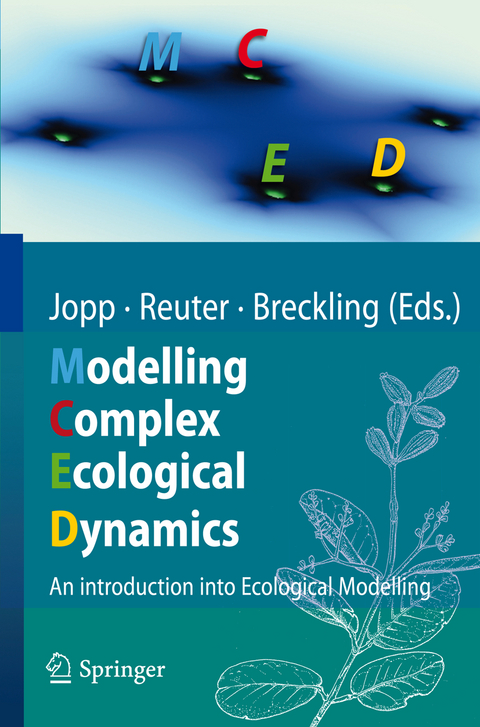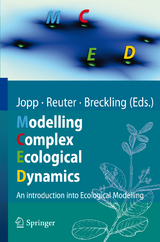Modelling Complex Ecological Dynamics
Springer Berlin (Verlag)
9783642050282 (ISBN)
Model development is of vital importance for understanding and management of ecological processes. Identifying the complex relationships between ecological patterns and processes is a crucial task. Ecological modelling-both qualitatively and quantitatively-plays a vital role in analysing ecological phenomena and for ecological theory. This textbook provides a unique overview of modelling approaches. Representing the state-of-the-art in modern ecology, it shows how to construct and work with various different model types. It introduces the background of each approach and its application in ecology. Differential equations, matrix approaches, individual-based models and many other relevant modelling techniques are explained and demonstrated with their use. The authors provide links to software tools and course materials. With chapters written by leading specialists, "Modelling Complex Ecological Dynamics" is an essential contribution to expand the qualification of students, teachers and scientists alike.
Editors: Fred Jopp (University of Miami, USA) Hauke Reuter (Leibniz Center for Tropical Marine Ecology, Bremen, Germany) Broder Breckling (University of Bremen, Germany) Authors: Esther M. Borell (The Interuniversity Institute (IUI) for Marine Sciences, Eilat, Israel) Broder Breckling (University of Bremen, Germany) Donald L DeAngelis (University of Miami, USA) Marko Debeljak (Jozef Stefan Institute, Ljubljana, Slovenia) Carsten F. Dormann (Helmholtz Centre for Environmental Research, Leipzig, Germany) Saso Dzeroski (Jozef Stefan Institute, Ljubljana, Slovenia) Alejandro Gallego (Marine Scotland, Aberdeen, UK) Robert H. Gardner (University of Maryland, Frostburg, USA) Aurélie Garnier (Office National de la Chasse et de la Faune Sauvage, Nantes, France) Fred Jopp (University of Miami, USA) Sven Erik Jørgensen (University of Copenhagen, Denmark) Dietmar Kraft (University of Oldenburg, Germany) Andreas Kubicek (Leibniz Center for Tropical Marine Ecology, Bremen, Germany) Winfried Kurth (University of Göttingen, Germany) Christoph Lange (Fraunhofer MEVIS, Bremen, Germany) Dirk Lanwert (University of Göttingen, Germany) Jane Lecomte (Université Paris-Sud 11, France) Horst Malchow (University of Osnabrück, Germany) Agnese Marchini (University of Pavia, Italy) Yiannis G Matsinos (University of the Aegean, Grecce) Felix Müller (University of Kiel, Germany) Søren Nors Nielsen (Copenhagen, Denmark) Guy Pe'er (Helmholtz Centre for Environmental Research, Leipzig, Germny) Hauke Reuter (Leibniz Center for Tropical Marine Ecology, Bremen, Germany) Michael Sieber (University of Osnabrück, Germany) Dagmar Söndgerath (TU Braunschweig, Germany) Marc Taylor (Alfred Wegener Institute, Bremerhaven, Germany) Joel C. Trexler (Florida International University, Miami, USA) Gerd Weigmann (FU Berlin, Germany) Matthias Wolff (Leibniz Center for Tropical Marine Ecology, Bremen, Germany)
Introduction; Theoretical backgrounds: Scope and general definitions used in ecological modelling; What are the general conditions, under which models can be applied?; History of ecological modelling, and modern developments.- Modelling Techniques and Approaches; Context assessment and Systems analysis; Steady State Models of Ecological Systems; Ordinary Differential Equations; Partial Differential EquationsCellular Automata; Leslie-Matrices; Fuzzy Sets; L-Systems, and Fractals; Agent- and Individual-based Models; Modelling landscape dynamics and Habitat Suitability; Decision trees and data mining.- Application fields, case studies and examples; Conceptual and theoretical models (Analysing Landscape Structure using Neutral Models); Case Studies: Application of ecological models in management (Coral-Algae-Interaction; Stage-structured invasion models; Trophic Cascades and Food Web Stability in Fish Communities of the Everglades); Case Studies: Model Coupling and Multi-scale issues (Bio-Physical Models: An Evolving Tool in Marine Ecological Research; Potentials of GIS - Model Coupling; Modelling the Everglades Ecosystem).- Strategies of model development; Model validation, Parameter estimation, Sensitivity Analysis.
From the reviews:
"This book is an edited collection of short chapters describing the variety and uses of mathematical models. Chapter authors ... present a diversity of perspectives on modeling. ... it is an overview of the purposes and types of models. ... more valuable for those already familiar with one type of modeling who want to develop a broader understanding of ecological models. Summing Up ... . Graduate students, researchers/faculty, and professionals." (M. P. Gustafson, Choice, Vol. 49 (6), February, 2012)
"Comprehensive knowledge in ecological modelling is thus essential in modern ecology and the edited textbook 'Modelling Complex Ecological Dynamics' (MCED) provides an excellent overview on the development and the state-of-the-art in this wide scientific field that goes far beyond classic or simple method application. ... a must read for graduate students, teachers and scientists in ecology." (Rainer Waldhardt, Basic and Applied Ecology, Vol. 13 (5), August, 2012)
From the reviews:“This book is an edited collection of short chapters describing the variety and uses of mathematical models. Chapter authors … present a diversity of perspectives on modeling. … it is an overview of the purposes and types of models. … more valuable for those already familiar with one type of modeling who want to develop a broader understanding of ecological models. Summing Up … . Graduate students, researchers/faculty, and professionals.” (M. P. Gustafson, Choice, Vol. 49 (6), February, 2012)“Comprehensive knowledge in ecological modelling is thus essential in modern ecology and the edited textbook ‘Modelling Complex Ecological Dynamics’ (MCED) provides an excellent overview on the development and the state-of-the-art in this wide scientific field that goes far beyond classic or simple method application. … a must read for graduate students, teachers and scientists in ecology.” (Rainer Waldhardt, Basic and Applied Ecology, Vol. 13 (5), August, 2012)
| Erscheint lt. Verlag | 4.3.2011 |
|---|---|
| Illustrationen | Melanie Trexler |
| Vorwort | Sven Erik Jørgensen, Donald DeAngelis |
| Zusatzinfo | XVII, 397 p. 131 illus. |
| Verlagsort | Berlin |
| Sprache | englisch |
| Maße | 155 x 235 mm |
| Gewicht | 626 g |
| Themenwelt | Naturwissenschaften ► Biologie ► Ökologie / Naturschutz |
| Schlagworte | ABM • Agent-based Models • Cellular Automata • Cellular Automaton • Complex • Complexity • Data Mining • Dynamical • Dynamics • Ecological • Ecology • Expert-Systems • Fuzzy Logic • Geo-Ecology • Geoökologie • Habitat Suitability Models • IBM • Individual-based Model • Invasion Models • landscape ecology • landscape management • Learning how to model • Leslie-Matrices • Model Coupling • Modeling • Modeling Concepts • Modeling in Ecology • Modelling • Modelling Concepts • modelling in ecology • model validation • nature conservation • ODE • Ordinary-Differential Equations • Partial-Differential Equations • PDE • Sensitivity Analysis • Space in Ecology • Spatially-Explicit • Steady-State models • Tree-Decisions Models • Variabilities • Variability • Variables |
| ISBN-13 | 9783642050282 / 9783642050282 |
| Zustand | Neuware |
| Informationen gemäß Produktsicherheitsverordnung (GPSR) | |
| Haben Sie eine Frage zum Produkt? |
aus dem Bereich




